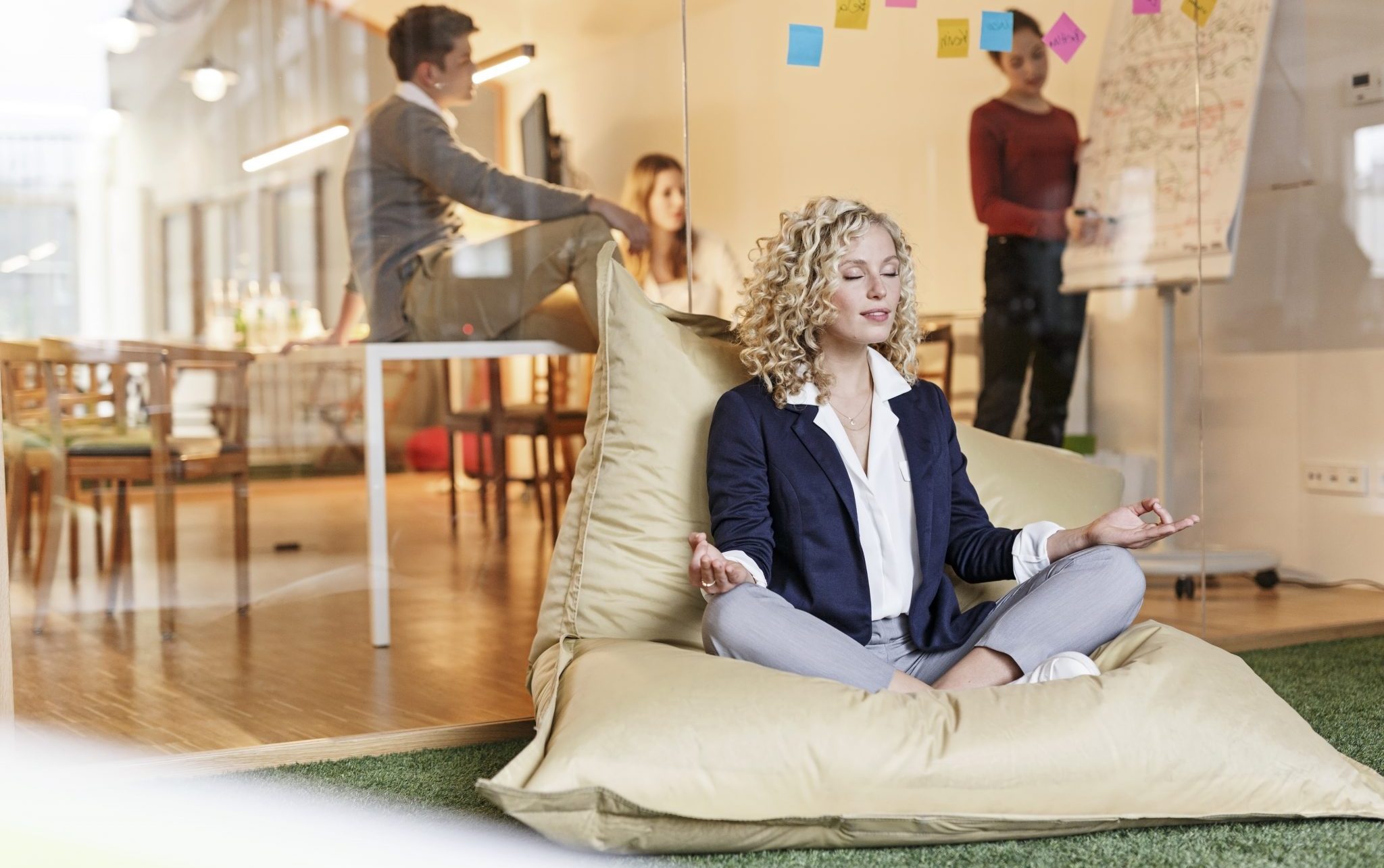Today, we are more chronically stressed than ever before. In a study by the CDC, a total of 71% of adults reported feeling symptoms of stress, including headaches, anxiousness, or feeling overwhelmed on a regular basis. And that makes stress one of the hugest mental health issues facing our generation today. Combining that with the unpredictability caused by coronavirus regulations—work-from-home, back-to-the-office, etc. —more people are looking at ways to manage work-related stress and develop stress-resistance strategies that promote good mental health. So, what is stress tolerance, and how can we make it work in our favor, so neither our mental health nor productivity suffer?
What is stress resistance all about?
Ever wondered why some of your co-workers remain so cool under stress, almost like they never break a sweat? Meanwhile, you feel like a bag of nerves every time a deadline is approaching, or you have to give a presentation? The secret is the ability to deal with stress and use it effectively.
Known as stress tolerance, this is a series of tools and attitudes that people use to deal with stressful situations while not damaging their mental health. It is true that some people are naturally better equipped to deal with stress, that doesn’t mean that it’s not possible to learn some tricks and tips to help. We’ll go into this deeper below, but, in general, these can be divided into:
- Mindset adjustors
- Environmental changes
- Health actions
All these factors work together to help improve your stress tolerance level in a healthy and productive way.
What is stress?

Even if it is “all in your mind,” that doesn’t mean it’s not a problem.
“It’s just in your head,” “it’s not real.” If you’ve been saying this to yourself, this is a sign to stop and rethink. Even if it is “all in your mind,” that doesn’t mean it’s not a problem. Mental discomfort can cause real physical problems. That said, in the same way, good mental health promotes physical health. Let’s learn how:
Meditation
A tried and tested technique that has roots deep in history. Meditation is a way to help your mind calm, regain focus and prepare for challenges. It can be as simple as sitting (or lying) in a comfortable space for a couple of minutes and practicing breathing exercises. Yes, you can even do this in the bathroom or free meeting room at work, if the situation calls for it. Follow this link to try some FREE MEDITATIONS from us to get you started.
Mantras
Mantras are not just some words you say and forget about. How you speak to and about yourself impacts how you see yourself on a daily basis. For example, if your inner voice always says, “I’m no good at W” then over time, you will avoid W and not be good at it.
Mantras: “I’m worth it” and “I’m going to rock this presentation.”
Conversely, if your inner voice speaks positively, you will begin to view yourself in a different light. For example, you may choose a positivity mantra, such as “I’m worth it” or focus more on “I’m going to rock this presentation.” Soon, that inner voice will become your reality. Remember, mantras can be included into your meditation practice or done separately—do what works for you.
Setting boundaries and saying no
Often, we feel obliged to do something even when it goes against our best instincts. Perhaps, for you, it’s staying late at work, answering emails at night, taking on one too many projects, or something similar (or even all of these). If this sounds like a familiar scenario to you, then it’s time to start setting some healthy boundaries and start saying no.
Be the best version of you by learning to say “no”
In the beginning, this may increase your anxiety levels due to the discomfort of saying no to others, but over time, you will start to see the tangible benefits to your physical and mental health. Additionally, a less stressed you is likely more productive and better able to focus on their actual job than worrying about all the extra tasks that you’ve piled on top.
Essentially, say no, focus, and be the best version of you.
Health actions: reducing stress through activity
 Although stress is often seen as a psychological issue, it’s vital to remember its connection with the physical. When we are stressed, we often experience physical symptoms, such as sore muscles, headaches, and others. Learning how to cope with these properly reduces the impact of stress and helps our body heal.
Although stress is often seen as a psychological issue, it’s vital to remember its connection with the physical. When we are stressed, we often experience physical symptoms, such as sore muscles, headaches, and others. Learning how to cope with these properly reduces the impact of stress and helps our body heal.
Massage
This therapy works to reduce the physical impact of stress on the body. It works to release those tense muscles, trapped nerves, and leaves you physically calmer. Human touch is a powerful tool and can work wonders when it comes to your ability to cope with emotional stress factors.
Exercise
When we exercise, our body releases feel-good hormones that combat stress and leave us feeling relaxed overall. The trick here is getting yourself motivated to get out there and work out. For this, it’s vital to take it step by step, and focus on doing just a little at a time. Soon, you’ll notice that a little effort goes a long way in stress reduction.
Yoga
A time-tested practice that has been used for thousands of years to bring peace and prosperity to the body. With yoga, not only will you gain physical fitness, but you’ll also relax your mind and body in the process.
Diet
We all know how tempting it is to snack on junk food when we are stressed. And while a little of the not-so-healthy foods won’t do you any long-term harm, too much is only going to add to your problems. Instead, focus on including foods for stress into your diet and snacking, such as those rich in vitamin B (eggs, chicken, fortified cereal, etc.), omega 3 (avocado, olive oil, flax seeds, walnuts, etc.), magnesium (bananas, spinach, pumpkin seeds, dark chocolate, etc.), and protein (almonds, lentils, quinoa, Greek yogurt, etc.).
Avoiding harmful substances
That glass of wine after work or painkillers can be so tempting to numb the stress and its symptoms. And there’s no doubt that they do—short-term. However, these are not long-term solutions, and you could be adding up to a much bigger problem—dependence. So, the best thing you can do, at least for now, is to say no and choose a healthier alternative.
Environmental changes: when something needs to change, and it’s not you
![]()
 FOMO
FOMO
Fear of missing our is one of the biggest issues facing us today. Armed with social media we are ever more connected, and yet we couldn’t be further apart. We are led to believe that the grass is greener on the other side, or that our colleagues are superhumans and the next Elon Musk. While for some, this is truly the case, it isn’t for everyone. And that’s ok. So, to deal with existential anxiety, you’re going to have to switch off social media and focus on yourself.
Learn to prioritize
Repeat after me, “not everything is urgent.” I know it may seem that way, but I promise it’s not, and learning how to priorities effectively means you are more likely to be successful and less stressed long-term. To deal with your general tasks, it’s worthwhile trying out the Eisenhower matrix. Here you divide your work-related tasks into:
- Urgent and important—do these tasks now
- Not urgent but important—add to your schedule
- Not important but urgent—delegate, if you can
- Not urgent or important—forget about for the moment.
But what if your boss comes to you with a “must-do” task? In this case, one of the best things you can do, is to ask him or her to help you prioritize this task and recognize that the priorities of your other tasks will shift to fit this new item on your list. Setting these priorities and boundaries means a more productive you, which is the best you there is for your work and home life.
Changing your environment completely
In some circumstances, your stress may be caused solely by your environment. This is often the case in toxic work environments, high-stress careers, or even in your home life where certain circumstances are beyond your control.
In these cases, it’s time to first seek external assistance in the form of a health professional. And two, consider IF this is something you can change. For example, if you are working in a toxic work environment, you may consider moving to a different department or changing jobs completely if the stress level is extreme. Whereas, if you have some circumstances at home that are extra stressful, for example, a sick relative, in which case you are a carer as well. Then you may want to consider seeking additional help.
Our environment, and all that surrounds us, can impact our health greatly, and, where possible, it may make sense to adjust your environment to suit you and your needs. So, ask yourself:
“Can I change it? And should I change it?”
What to do if you’re feeling acute stress or having a panic attack?
As you’ve probably noticed above, we’ve talked about the long-term solutions to stress resistance at work. But what if you’re experiencing acute stress or a panic attack? What should you do if this happens?
Note: If you find yourself experiencing panic attacks, it’s essential you get in touch with a professional, either a doctor or a psychologist, to help.
If you are feeling overwhelmed right now, here are some steps you can take:
- Recognize it for what it is—a panic attack. Take the time to stop what you are doing and find a safe space. You may have to excuse yourself from what you are doing. Find somewhere calm and quiet.
- Get comfortable. Sit or lie down. Allow your body to calm. It’s ok.
- Close your eyes and take three deep breaths. Now, focus on your breathing until you feel your heart rate returning to normal.
Once you have got through the worst of it, it’s time to commit to some self-care. Get in touch with your health professional and find out why this happened and what you can do about it.
Thanks for joining us to learn more about stress management. Remember, if you are feeling stressed or down all the time, the best thing you can do is reach out and get help.






































